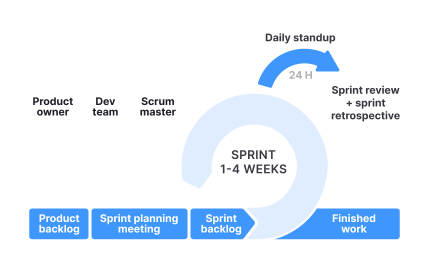Scrum Master
A scrum master facilitates agile ceremonies, removes blockers, and supports the team in following Scrum practices and staying on track.
What is Scrum Master?
Your agile teams struggle with impediments and process issues because no one owns the responsibility for removing blockers and improving team dynamics, leading to frustrated developers, stalled work, and scrum ceremonies that feel like wastes of time rather than valuable collaboration.
Most organizations assign project managers to run scrum events without understanding the servant-leadership role, missing the crucial coaching and facilitation that transforms groups of individuals into high-performing teams capable of delivering exceptional value consistently.
A Scrum Master is a servant-leader who facilitates scrum events, removes impediments, coaches teams in agile practices, and protects them from distractions, enabling sustainable delivery pace and continuous improvement rather than just tracking tasks and running meetings.
Teams with effective Scrum Masters achieve 45% higher velocity, experience 60% fewer impediments, and report significantly better job satisfaction because someone actively works to make their lives easier rather than adding oversight burden to already busy developers.
Think about how companies like Spotify evolved the Scrum Master role into Agile Coaches who enable squad autonomy, or how successful transformations at ING depended on Scrum Masters who transformed culture rather than just running ceremonies.
Why Scrum Masters Matter for Team Success
Your scrum implementation feels mechanical and burdensome because teams go through motions without understanding why, leading to resentment of "agile theater" that adds meetings without improving actual delivery or team satisfaction.
The cost of ineffective Scrum Masters compounds through every sprint with unresolved impediments. You lose productivity to repeated blockers, suffer team morale issues, miss improvement opportunities, and fail to realize agile benefits when scrum becomes overhead rather than enablement.
What effective Scrum Masters deliver:
Better team performance and delivery predictability because Scrum Masters actively remove impediments rather than just noting them in spreadsheets for someone else to maybe address eventually.
When Scrum Masters excel, teams focus on building great products rather than fighting organizational dysfunction or struggling with unclear requirements and technical blockers.
Enhanced team dynamics and collaboration through skilled facilitation that draws out quiet voices and manages dominant personalities rather than letting meetings become monologues.
Improved agile maturity and self-organization because great Scrum Masters coach teams toward independence rather than creating dependency on their coordination.
Stronger psychological safety and innovation as Scrum Masters protect teams from blame and create environments where experimentation and learning from failure become normal.
Sustained pace and prevented burnout through Scrum Masters who guard sustainable pace rather than allowing continuous crunch disguised as "sprints."
Step 1: Master Facilitation and Coaching Skills (Month 1)
Develop ability to guide without controlling, asking powerful questions that help teams discover solutions rather than providing answers that create dependency.
This creates Scrum Master foundation based on empowerment rather than command-and-control project management dressed in agile vocabulary.
Step 2: Build Deep Scrum and Agile Knowledge (Month 1-2)
Understand why each scrum element exists and how they interconnect rather than mechanically following framework, enabling adaptation while maintaining essential principles.
Focus learning on principles and values rather than rigid rule following, preparing to guide teams through unique challenges rather than textbook scenarios.
Step 3: Develop Impediment Removal Systems (Month 2-3)
Create processes for identifying, tracking, and resolving blockers rather than just listing problems, building organizational relationships that enable swift resolution.
Balance immediate firefighting with systemic improvement to address root causes rather than repeatedly solving same problems every sprint.
Step 4: Foster Team Self-Organization (Month 3-4)
Guide teams toward owning their process and improvements rather than depending on Scrum Master direction, building capability rather than creating indispensable coordinator role.
Step 5: Measure and Demonstrate Value (Month 4+)
Track whether Scrum Master activities improve team outcomes rather than just activity metrics, showing concrete value rather than assuming the role justifies itself.
This ensures Scrum Masters enhance team performance rather than becoming expensive meeting facilitators without measurable impact on delivery.
If Scrum Master role doesn't improve results, examine whether focus stays on team enablement rather than process compliance enforcement.
Recommended resources
Courses

Accessibility Foundations

Wireframing







